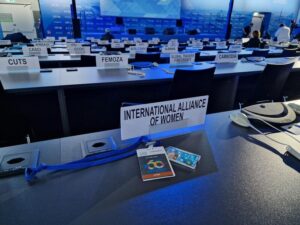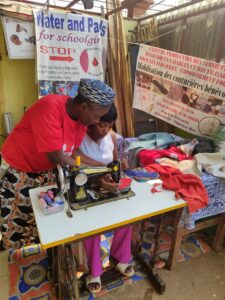 From 3-5 November 2014 about 700 people , mainly women, representing women’s NGOs, institutions and networks from 56 countries came together in Geneva for the NGO Forum review of the Beijing Platform for Action. Similar meetings will be held in other regions of the world.
From 3-5 November 2014 about 700 people , mainly women, representing women’s NGOs, institutions and networks from 56 countries came together in Geneva for the NGO Forum review of the Beijing Platform for Action. Similar meetings will be held in other regions of the world.
The outcome was a declaration and recommendations in 10 areas of concern.
The declaration recognizes the achievements made in the UN ECE region. Among them is the progress made in education, the fact that fewer women die in pregnancy and childbirth, and there is an increased number of women in decision making. Strong normative, legal and policy frameworks have been introduced to address a range of issues. However, these are undermined by lack of full implementation, compliance and accountability. Data collection has improved, but there is still an immense need for gender segregated data and information. Gender sensitive budgeting has been introduced, but is not applied to all sectors by all countries.
However, the participants express their deep concerns for sustainability, women’s and human rights. The UNECE region faces a number of crises: financial, energy, climate and food. Austerity measures used as a response to the economic and financial crises are pushing women back into their traditional roles. The global gap between rich and poor is growing every day. Women experience time poverty. Violations of and threats to girls and women’s sexual and reproductive health and rights call for protection and advancement of the Beijing Platform for Action and CEDAW in the post 2015 agenda as well as regional instruments such as the Istanbul Convention.
The women’s agenda has remained at the traditional social and micro levels. Transformation, however, requires addressing the structural and macro issues that perpetuate inequalities, discrimination and exclusion.
Militarization is increasingly used as the answer to conflict. The result is always gross violations of the human rights of women and girls. The government approach to development inextricably links development, aid, trade, investment and foreign policy. This reduces women’s rights to a sub-text of global capitalism rather than making it central to achievement of peace and sustainable development.
Of special concern is the rise in unemployment in Eastern Europe and the complacency to women’s issues in Western Europe and North America . Violence against women and girls is still pervasive and is further perpetuated through technology and social media. Young women and girls face psychological pressures, including sexualisation of their bodies.
Against this background the participants call for
- Fulfillment of the Beijing commitments
- A clear and stand –alone goal on gender equality and women’s rights in the post 2015 development agenda
- CEDAW as the framework for monitoring and accountability of government commitments
- Women’s equal access to resources
- Investment in women and girls’ rights
- Ending violence against women and girls
- Focus on women as users, shapers and leaders of new technologies


